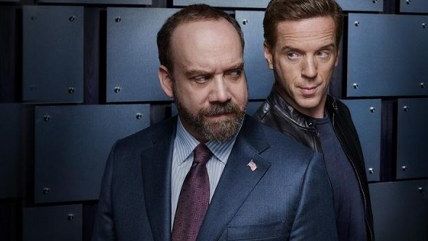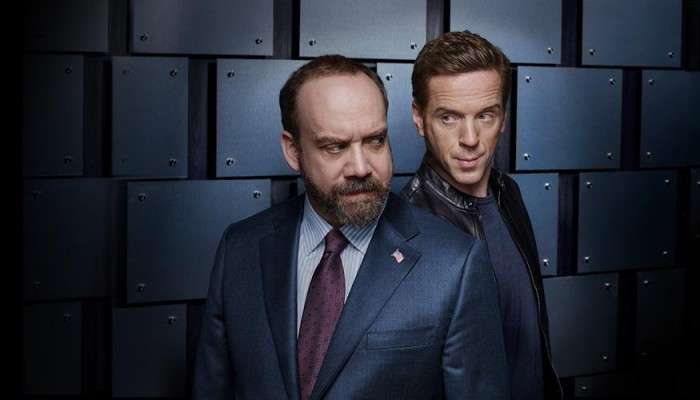Billions and Baskets Excel at Wildly Divergent Story Concepts
Rich Wall Street ambition vs. desperately, comically sad clown


- Billions. Showtime. Sunday, January 17, 10 p.m.
- Baskets. FX. Thursday, January 21, 10 p.m.
New York Times TV critic John Leonard once declared that on television, "To be in business is to ride a monorail of avarice to disaster and bad sex." There's plenty of all three in Showtime's new Wall Street drama Billions, but it would be a mistake to dismiss this show as simply another Hollywood tirade against capitalism. It's a mostly intelligent and well-written deliberation on the linkage between ruthless ambition and success, which in the eyes of Billions spills across all social and political partitions. The bad sex does, too.
Billions is built around the collision of two irresistable forces: mega-rich hedge-fund tycoon Bobby Axelrod (Damian Lewis,Homeland) and gimlet-eyed U.S. attorney Chuck Rhoades (Paul Giamatti, Sideways). Neither is very lovable.
Axelrod, who grew up on the wrong side of the tracks ("He went to Hoffstra!" murmurs one appalled trader), now presides over a financial empire built on blackmail, corporate espionage and insider trading. Though not without a sentimental streak—he buys his old Brooklyn neighborhood pizza parlor to save the owner from a developer—he's also happy to toss a trading colleague to the sharks for cover when it seems helpful.
Employees who fall from favor are fired if they're lucky—"you'll figure it out or you'll be gone," he says to one newbie by way of introduction—and blackballed from the industry for life if not.
Rhoades, the politically minded offspring of old Manhattan money, is scarcely less prickly. Beset with private kinks that would make Krafft-Ebing blush, he's nonetheless got his eye on higher office and views his undefeated record in white-collar financial-flim-flammery cases as a major stepping stone to that goal, even if it's been achieved mostly by mercilessly rolling over minor figures for punk offenses.
That means sticking to low-hanging corporate fruit for prosecution, and when Axelrod flits across his radar—three apparent cases of insider trading by funds closely tied to him—Rhoades is reluctant to get involved. Axelrod, Rhoades warns his staff, "is Mike Tyson in his prime." Another complication: Rhoades' industrial-psychologist wife Wendy (Maggie Siff, Sons Of Anarchy), the family's principal earner, not only works for Axelrod but is a member of his inner circle.
What finally persuades Rhoades to start muzzle-loading the Justice Department artillery is not incontrovertible evidence of corruption but the nouveau-rich Axelrod's acquisition of a seaside mansion in the Hamptons from a family of broke Brahmins. Both men are breaking the fundamental rule that Wendy Rhoades preaches to her over-cojoned clients: "Don't get into a bitch fight over nothing."
The shortage of white hats is one major factor that elevates Billions several cuts above your average Gordon Gekkoesque tale of Wall Street avidity. This is a tale without a moral high ground; Axelrod and Rhoades are mirror images of one another, manipulative and single-minded in feral pursuit of their self-aggrandizing goals.
In fact, despite the presence of veteran business journalist Andrew Ross Sorkin on the production team (which also includes Brian Koppelman and David Levien, co-authors on the Ocean's Thirteen screenplay), Billions pays surprisingly little attention to the details of investment banking or hedge funds, much less the arcane politesse of SEC rules. This is a story about not Wall Street but what happens when powerful, amoral men go after one another in a fight without rules or restraints. It might not be pretty, but it's always fascinating.
The same might be said, in a very different tone of voice, about FX's deadpan sitcom Baskets, which stars slob-comedy king Zach Galifianakis as Chip Baskets, a broke washout from a Parisian clown academy (who could have imagined the inability to speak French would be such a hindrance?) forced to return home to Bakersfield and take an uber-plebian job as a rodeo clown. His signature gag: lip-synching to Edith Piaf while being trampled by a bull.
If the scorn of the Bakersfield rubes for a clown without a big red nose is not enough, Baskets must overcome the opposition of his own family. His twin brother counsels a career in ice-cream truck management. His slinkily gorgeous, green-card-seeking wife Penelope (electronica vocalist Sabina Sciubba) suggests aiming lower: "Why don't you work in a roast-beef shop?" His mother (played by a cross-dressing Louie Anderson in a bit of stuntcasting that sounds stupid but works surprisingly well) helpfully notes that a job at Arby's comes has extra enticements: "Bonus—curly fries."
At some moments a withering mockery of existential French cinema ("Don't call me darling," orders the bored Penelope, cigarette barely moving in her lips) and at others the work of a screenwriter dropped repeatedly on his head (singing the national anthem at Baskets' rodeo debut: Kato Kaelin), Baskets is difficult to categorize but extremely funny. Just don't call it darling.


Show Comments (5)